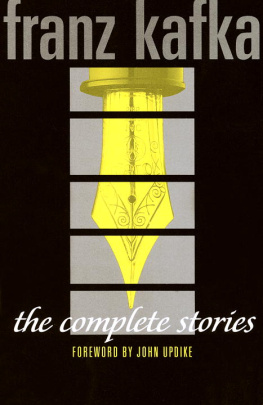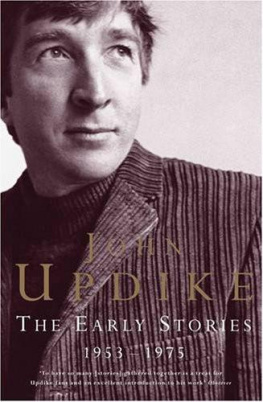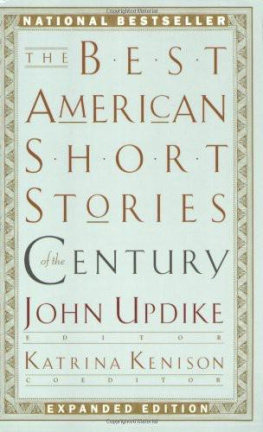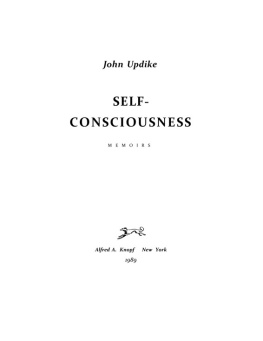Franc Kafka - The Complete Stories (forword by John Updike)
Here you can read online Franc Kafka - The Complete Stories (forword by John Updike) full text of the book (entire story) in english for free. Download pdf and epub, get meaning, cover and reviews about this ebook. genre: History. Description of the work, (preface) as well as reviews are available. Best literature library LitArk.com created for fans of good reading and offers a wide selection of genres:
Romance novel
Science fiction
Adventure
Detective
Science
History
Home and family
Prose
Art
Politics
Computer
Non-fiction
Religion
Business
Children
Humor
Choose a favorite category and find really read worthwhile books. Enjoy immersion in the world of imagination, feel the emotions of the characters or learn something new for yourself, make an fascinating discovery.

- Book:The Complete Stories (forword by John Updike)
- Author:
- Genre:
- Rating:4 / 5
- Favourites:Add to favourites
- Your mark:
- 80
- 1
- 2
- 3
- 4
- 5
The Complete Stories (forword by John Updike): summary, description and annotation
We offer to read an annotation, description, summary or preface (depends on what the author of the book "The Complete Stories (forword by John Updike)" wrote himself). If you haven't found the necessary information about the book — write in the comments, we will try to find it.
The Complete Stories (forword by John Updike) — read online for free the complete book (whole text) full work
Below is the text of the book, divided by pages. System saving the place of the last page read, allows you to conveniently read the book "The Complete Stories (forword by John Updike)" online for free, without having to search again every time where you left off. Put a bookmark, and you can go to the page where you finished reading at any time.
Font size:
Interval:
Bookmark:
The Complete Stories
Franz Kafka
Copyright 1971 by Schocken Books Inc.
All rights reserved under International and Pan-American Copyright Conventions.
Published in the United States by Schocken Books Inc., New York.
Distributed by Pantheon Books, a division of Random House, Inc., New York.
The foreword by John Updike was originally published inThe New Yorker.
Foreword copyright 1983 by John Updike.
Collection first published in 1971 by Schocken Books Inc.
Library of Congress Cataloging-in-Publication Data
Kafka, Franz, 1883-1924.
The complete stories.
(Kafka Library)
Bibliography: p.
1. Kafka, Franz, 1885-1924 Translations, English.
I. Glatzer, Nahum Norbet, 1903- . I. Title.
. Series.
PT2621.A26A2 1988 833'.912 88-18418
ISBN 0-8052-0873-9
Manufactured in the United States of America
3 5 7 9 8 6 4 2
Contents
Copyright
Foreword by John Updike
TWO INTRODUCTORY PARABLES
Before the Law*
An Imperial Message*
THE LONGER STORIES
Description of a Struggle
Wedding Preparations in the Country
The Judgment*
The Metamorphosis*
In the Penal Colony*
The Village Schoolmaster [The Giant Mole]
Blumfeld, an Elderly Bachelor
The Warden of the Tomb
A Country Doctor*
The Hunter Gracchus
The Hunter Gracchus: A Fragment
The Great Wall of China
The News of the Building of the Wall: A Fragment
A Report to an Academy*
A Report to an Academy: Two Fragments
The Refusal
A Hunger Artist*
Investigations of a Dog
A Little Woman*
The Burrow
Josephine the Singer, or the Mouse Folk*
THE SHORTER STORIES
Children on a Country Road*
The Trees*
Clothes*
Excursion into the Mountains*
Rejection*
The Street Window*
The Tradesman*
Absent-minded Window-gazing*
The Way Home*
Passers-by*
On the Tram*
Reflections for Gentlemen-Jockeys*
The Wish to Be a Red Indian*
Unhappiness*
Bachelor's Ill Luck*
Unmasking a Confidence Trickster*
Sudden Walk*
Resolutions*
Dream*
Up in the Gallery*
A Fratricide*
The Next Village*
A Visit to a Mine*
Jackals and Arabs*
The Bridge
The Bucket Rider
The New Advocate*
An Old Manuscript*
The Knock at the Manor Gate
Eleven Sons*
My Neighbor
A Crossbreed [A Sport]
The Cares of a Family Man*
A Common Confusion
The Truth About Sancho Panza
The Silence of the Sirens
Prometheus
The City Coat of Arms
Poseidon
Fellowship
At Night
The Problem of Our Laws
The Conscription of Troops
The Test
The Vulture
The Helmsman
The Top
A Little Fable
Home-Coming
First Sorrow*
The Departure
Advocates
The Married Couple
Give it Up!
On Parables
Postscript
Bibliography
Editors and Translators
On the Material
Chronology
Selected Writings on Kafka
Back Cover
* Published during Kafka's lifetime.
FOREWORD
By John Updike
All that he does seems to him, it is true, extraordinarily new, but also, because of the incredible spate of new things, extraordinarily amateurish, indeed scarcely tolerable, incapable of becoming history, breaking short the chain of the generations, cutting off for the first time at its most profound source the music of the world, which before him could at least be divined. Sometimes in his arrogance he has more anxiety for the world than for himself.
KAFKA,"He" (Aphorisms)
THEcentury since Franz Kafka was born has been marked by the idea of "modernism" a self-consciousness new among centuries, a consciousness of being new. Sixty years after his death, Kafka epitomizes one aspect of this modern mind-set: a sensation of anxiety and shame whose center cannot be located and therefore cannot be placated; a sense of an infinite difficulty within things, impeding every step; a sensitivity acute beyond usefulness, as if the nervous system, flayed of its old hide of social usage and religious belief, must record every touch as pain. In Kafka's peculiar and highly original case this dreadful quality is mixed with immense tenderness, oddly good humor, and a certain severe and reassuring formality. The combination makes him an artist; but rarely can an artist have struggled against greater inner resistance and more sincere diffidence as to the worth of his art.
This volume holds all of the fiction that Kafka committed to publication during his lifetime:* a slender sheaf of mostly very short stories, the longest of them, "The Metamorphosis," a mere fifty pages long, and only a handful of the others as much as five thousand words. He published six slim volumes, four of them single stories, from 1913 to 1919, and was working on the proofs of a seventh in the sanatorium where he died on June 3rd, 1924, of tuberculosis, exactly one month short of his forty-first birthday. Among his papers after his death were found several notes addressed to his closest friend, Max Brod. One of them stated:
Of all my writings the only books that can stand are these:The Judgment, The Stoker, Metamorphosis, Penal Colony, Country Doctorand the short story:Hunger-Artist. . .When I say that those five books and the short story can stand, I do not mean that I wish them to be reprinted and handed down to posterity. On the contrary, should they disappear altogether that would please me best. Only, since they do exist, I do not wish to hinder anyone who may want to, from keeping them.
* The single exception is "The Stoker," published asDer Heizer, Ein Fragmentin 1913 but now incorporated, in German and in English, as the first chapter of Kafka's unfinished novelAmerika.
The little canon that Kafka reluctantly granted posterity would, indeed, stand; "The Metamorphosis" alone would assure him a place in world literature, though undoubtedly a less prominent place than he enjoys thanks to the mass of his posthumously published novels, tales, parables, aphorisms, and letters. The letter quoted above went on to direct Brod to burn all of Kafka's manuscripts, "without exception and preferably unread." Another note, written later, reiterated the command even more emphatically; and Dora Dymant, the young woman with whom Kafka shared the last year of his life, obediently did destroy those portions of the Kafka hoard within her keeping. But Brod disobeyed. Predictably: while Kafka was alive Brod had often elicited manuscripts from his excessively scrupulous friend and was instrumental in the publication of some few of them. In Brod's words: "he knew with what fanatical veneration I listened to his every word. . . during the whole twenty-two years of our unclouded friendship, I never once threw away the smallest scrap of paper that came from him, no, not even a post card." In a conversation of 1921 he warned Kafka he would burn nothing. And so with good conscience the reverent executor issued to the world
Next pageFont size:
Interval:
Bookmark:
Similar books «The Complete Stories (forword by John Updike)»
Look at similar books to The Complete Stories (forword by John Updike). We have selected literature similar in name and meaning in the hope of providing readers with more options to find new, interesting, not yet read works.
Discussion, reviews of the book The Complete Stories (forword by John Updike) and just readers' own opinions. Leave your comments, write what you think about the work, its meaning or the main characters. Specify what exactly you liked and what you didn't like, and why you think so.










